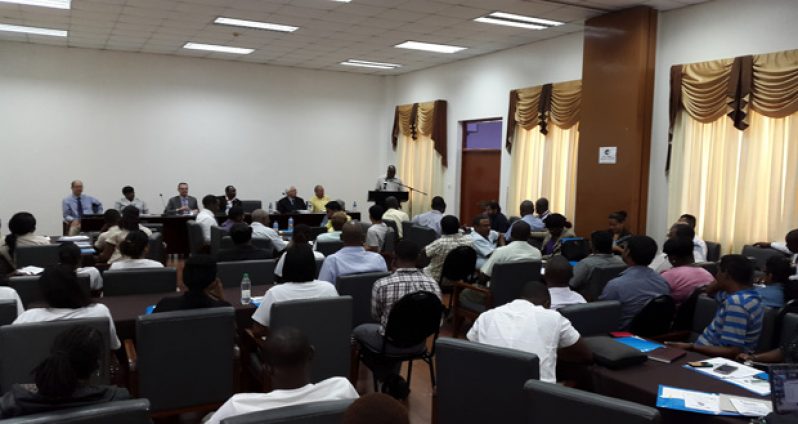–one of four countries in South America
By Rabindra Rooplall
GUYANA is among four countries in South America to be free of the dreaded foot-and-mouth disease (FMD), and the Food and Agriculture Organisation (FAO) is working towards bringing more countries under control.The other South American countries to be so classified are Chile, Uruguay and French Guiana, FOA Representative Reuben Robertson said yesterday during his address at the “One Health Animal Disease Recognition and Response Workshop” hosted at the Arthur Chung Convention Centre at Liliendaal, on the lower East Coast.
EDUCATING STAKEHOLDERS
In order to increase capacity to anticipate, recognise, identify and respond to priority exotic, endemic and zoonotic animal diseases across the Caribbean region, the workshop aims to educate stakeholders on the topic. The workshop was attended by Veterinarian Dr Steve Surujbally, One Health Project Leader, Chris Oura, Permanent Secretary of the Ministry of Agriculture, George Jervis and other stakeholders.
The goal of the three-day workshop is to increase food security in the Caribbean region by decreasing the risk of livestock production losses due to foreign, endemic and zoonotic animal diseases. Its objective is to train and improve the ability of Caribbean veterinarians, animal health assistants, livestock keepers and farmers to accurately recognize and respond to priority animal zoonotic and foodborne diseases.
In addition, the workshop aims to train national and regional veterinary personnel, livestock production personnel, livestock producers and farmers to identify and respond to priority animal zoonotic and foodborne diseases. Further, participants will receive relevant information to veterinary first responders and trainers from the Caribbean region.
Robertson said the major objectives focus on Guyana’s readiness and capacities to deal with any eventual outbreak of devastating diseases, one being FMD.
The disease is a severe, highly contagious viral disease. The FMD virus causes illness in cows, pigs, sheep, goats, deer and other animals with divided hooves. It does not affect horses, dogs, or cats.
Robertson said despite years of efforts to eradicate the FMD from South America the disease is still present in the region.
THREAT TO GUYANA
“Its presence in neighbouring countries poses a direct threat to Guyana, mainly through the legal and illegal movement of livestock, livestock products and the movement of people. In addition, the disease is present in large parts of Asia, Africa and Europe which are trading partners with Guyana – the virus could inadvertently appear in Guyana,” the FAO representative explained.
Referring to the importance of the livestock sector to Guyana’s food and nutrition security, he noted that the introduction of FMD would undermine the national and economic security livelihood if measures are not put in place to safeguard the country.
He said that one of Europe’s oldest commissions is the one dealing with the control of FMD and commenced in June 1954. Robertson said the commission is still very active and the disease is still present in a large part of the Euro-Asia land mass with over 100 countries.
He said the Guyana Livestock Development Authority (GLDA) had provided training for its technical staff for FMD control and response mechanism.
“The FAO is pleased to collaborate with all its sister agencies to support Guyana in its drive to remain free of FMD and to strengthen its preparedness strategy,” the FAO official noted.
Permanent Secretary George Jervis said the livestock sector needs the best personnel, and the torch should be passed to the youths who need to understand their role.



.jpg)











